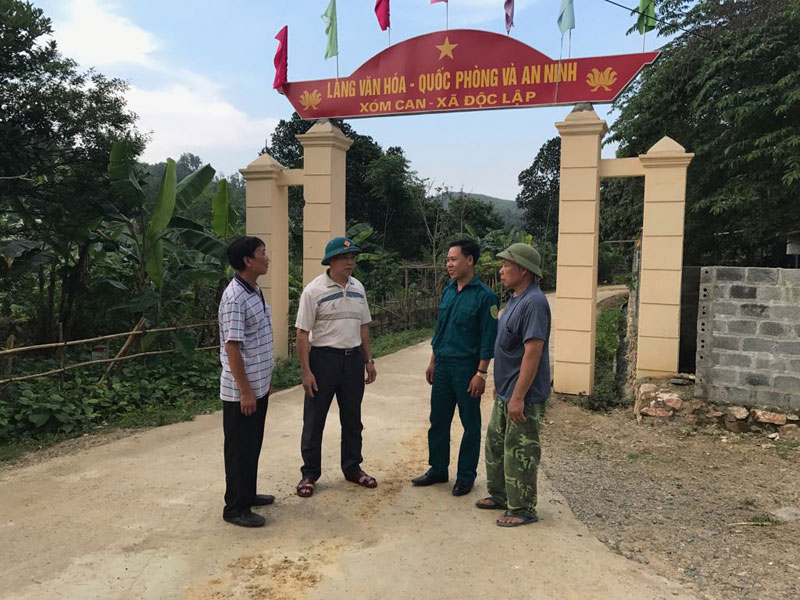
(HBO) – By implementing the model of "village of culture, defence and security”, the military and residents in Can hamlet of Doc Lap commune, Ky Son district (Hoa Binh province) have gradually eliminated poverty, improved intellectual standards, ensured defence and promoted the local well-being.
The military and residents in Can
hamlet of Doc Lap commune (Ky Son district) share experience in building the
"village of culture, defence and security” model.
Deriving from the "village of culture” model in
2005, although the building of "village of culture, defence and security” is
now just in the initial stage, it has always received support from local
people. Over the past years, the military and residents have jointly
constructed and repaired roads and civil facilities, while many disadvantaged
families have been assisted in house building and crop and livestock farming.
Instead of self-supply production like in the
past, agricultural activities have been expanded, becoming a considerable
source of income for many families. Almost all areas of low-value plants and
uncultivated land have been replaced with gardens of cardiopteris quinqueloba,
green bean, wax gourd and bitter melon trees, among others, which have
generated high profits.
Can hamlet is now home to 3ha of wax gourd and
0.5ha of bitter melon, along with one chicken farming cooperative group with
more than 10 member families.
The roads to this hamlet used to turn muddy and
slippery when the rain fell but thanks to efforts of local administration, the
military and people, the three roads with total length of over 2km have been
paved. Fifty-seven households in the hamlet donated more than 6,930 square
metres of land to expand roads and build infrastructure, a cultural centre and
irrigation facilities. Monthly clean-up activities are also carried out to
protect the environment.
In 2017, residents in Can hamlet and the
military actively took part in building new-style rural areas. They cleaned up
roads through villages, dredged canals, reinforced eroded roads with rocks, and
repaired houses for flood victims./.
In the spirit of "Party members go first, the people follow”, all households of Party members in the Doan Ket sub-region in Da Bac town, Da Bac district, voluntarily removed gates and fences, and donated land when the road expansion project passed through their properties. Inspired by their example, 68 households in the sub-region quickly followed suit, contributing over 1,400 sq.m of residential and perennial cropland to widen the main road through the residential area. The exemplary role of Party members in Doan Ket stands as a shining example of studying and following President Ho Chi Minh’s thought, morality, and lifestyle.
The Hoa Binh provincial People's Committee held a monthly meeting on May 29 to assess the implementation of socio-economic development tasks in the first six months of 2025, the progress of key projects, and some other important issues.
During his lifetime, President Ho Chi Minh always expressed his deep affection and special concern for children and youth. He once emphasized: "Caring for and educating children well is the responsibility of the entire Party and the entire people”; "First of all, the family (i.e. grandparents, parents, siblings) must do this job well”. "the Party Committees…, the Children’s Committee, the Youth Union, the education sector, and all related organizations must have specific plans to ensure children grow healthier and more progressive”. His teachings has been remaining valuable and serving as the guiding principles in the work of protecting, caring for, and educating children. In line with this ideology, Hoa Binh Province has continuously been prioritizing and investing resources in the well-being of children in recent years.
Mr. Nguyen Phi Long, the alternate Member of the Party Central Committee and Secretary of the Provincial Party Committee chaired the meeting of the Standing Committee of the Provincial Party Committee to provide opinions on several investment projects within the province. There was the attendance of Ms. Bui Thi Minh, the Permanent Deputy Secretary of the Provincial Party Committee and Chairwoman of the Provincial People’s Council; Mr. Bui Đuc Hinh, the Deputy Secretary of the Provincial Party Committee and Chairman of the Provincial People’s Committee and other members of the Standing Committee; the leaders from other departments, agencies, and some localities.
The Standing Board of the Vietnam Fatherland Front (VFF) Committee of Hoa Binh province held a meeting on May 28 to honour outstanding village elders, village heads, and reputable individuals from local ethnic minority and religious communities.
In mid-May, the provincial Museum organised an exhibition named "Duoi la co Dang Cong san Viet Nam quang vinh” (Under the flag of the glorious Communist Party of Vietnam). This meaningful activity took place in the joyful atmosphere to celebrate the country's major holidays and the Party congresses at all levels for the 2025-2030 term, towards the 14th National Party Congress.



